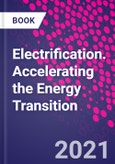Electrification: Accelerating the Energy Transition offers a widely applicable framework to delineate context-sensitive pathways by which this transition can be accelerated and lists the types of processes and structures that may hinder progress towards this goal. The framework draws insights from well-established literature, ranging from technological studies to socio-technical studies of energy transitions, on to strategic niche management approaches, (international) political economy approaches, and institutionalist literatures, while also adopting wider social theoretical ideas from structuration theory. Contributors discuss a multitude of case studies drawn from global examples of electrification projects.
Brief case studies and text boxes help users further understand this domain and the technological, infrastructural and societal structures that may exercise significant powers.
Please Note: This is an On Demand product, delivery may take up to 11 working days after payment has been received.
Table of Contents
Part I Framework for transition to electrification1. Introduction: electrification and the energy transition
PAMI AALTO, TERESA HAUKKALA, SARAH KILPELAINEN, AND MATTI KOJO
2. Globally and locally applicable technologies to accelerate electrification
C. JOHANNES MUTH, PAMI AALTO, FANNI MYLLARI, TOPI RONKKO, AND PIRKKO HARSIA
3. How to accelerate electrification? The leverage of policies
PAMI AALTO, KIRSI KOTILAINEN, BENJAMIN SOVACOOL, AND KIM TALUS
Part II Part-solutions
4. How can society accelerate renewable energy production?
TERESA HAUKKALA, HANNELE HOLTTINEN, JUHA KIVILUOMA, AKIHISA MORI, SIRJA-LEENA PENTTINEN, SARAH KILPELAINEN, KIM TALUS, AND PAMI AALTO
5. The role of energy storage and backup solutions for management of a system with a high amount of variable renewable power
JUHA KOSKELA, SIRJA-LEENA PENTTINEN, TAIMI VESTERINEN, HANNELE HOLTTINEN, JUKKA KONTTINEN, PERTTI JARVENTAUSTA, JUHA KIVILUOMA, PAMI AALTO, AND KIM TALUS
6. Toward smarter and more flexible grids
SAMI REPO, HANNELE HOLTTINEN, TOMAS BJORKQVIST, KIMMO LUMMI, JUSSI VALTA, LASSE PELTONEN, AND PERTTI JARVENTAUSTA
7. Policies for climate-neutral road transport
MATTI KOJO, KALLE ARO, KIRSI KOTILAINEN, AKIHISA MORI, ANNA PAAKKONEN, ANTTI RAUTIAINEN,
JUSSI VALTA, PAMI AALTO, JUKKA KONTTINEN, AND BENJAMIN SOVACOOL
8. Electrification and energy efficiency in buildings: Policy implications and interactions
SIRJA-LEENA PENTTINEN, KARI KALLIOHARJU, JAAKKO SORRI, JUHANI HELJO, AND PIRKKO HARSIA
9. From energy consumers to prosumers--how do policies influence the transition?
KIRSI KOTILAINEN, JUSSI VALTA, ULLA A. SAARI, MATTI KOJO, AND ILKKA RUOSTETSAARI
10. Anticipating future trends in energy transition: Multilevel dynamics in energy policy agenda-setting
JARI KAIVO-OJA, JARMO VEHMAS, AND JYRKI LUUKKANEN
Part III Combining part-solutions
11. How to combine various solutions in a national context?
TOMAS BJORKQVIST, YRJO MAJANNE, AND MATTI VILKKO
12. Analyzing electrification scenarios for the northern European energy system
ESA PURSIHEIMO AND JUHA KIVILUOMA
13. Toward a roadmap for electrification
PAMI AALTO, MATTI KOJO, AND AKIHISA MORI








